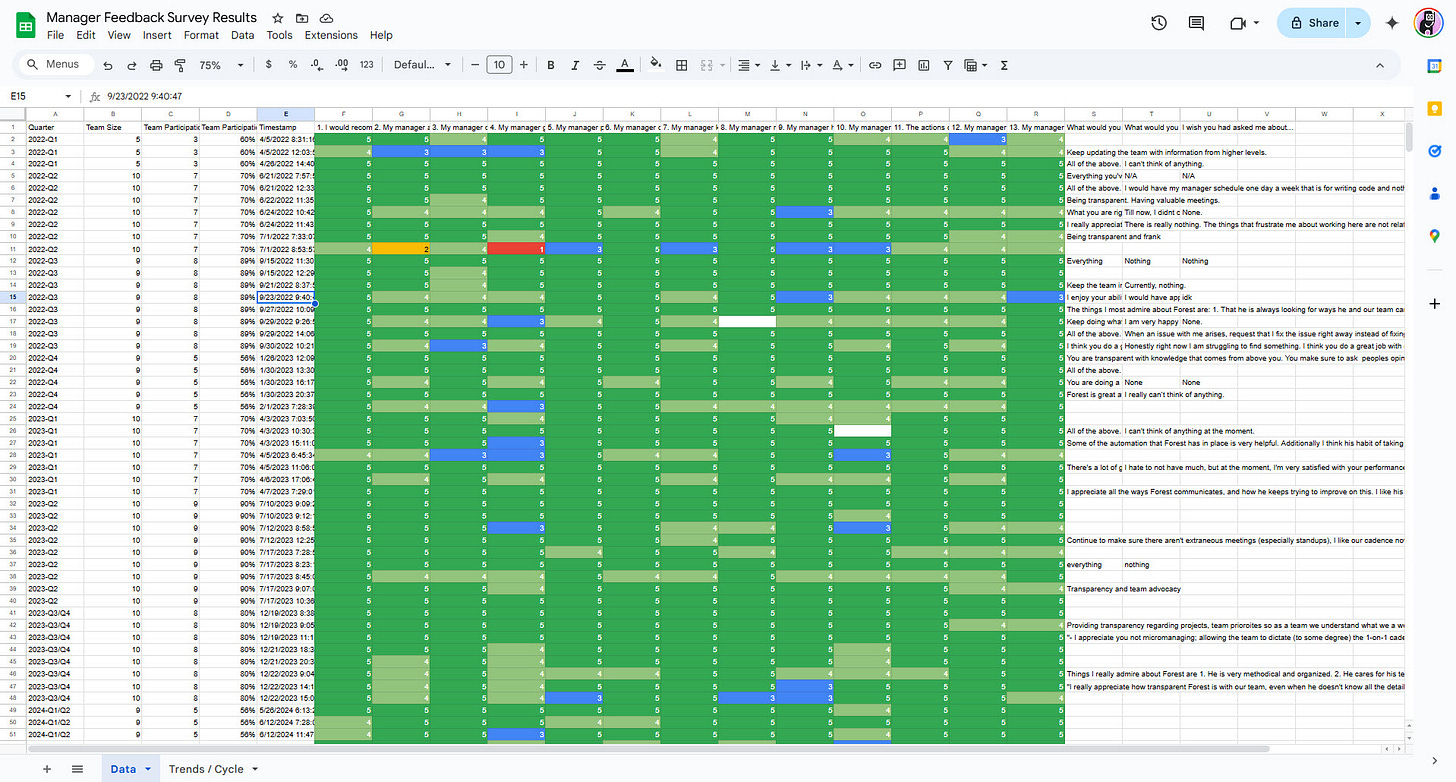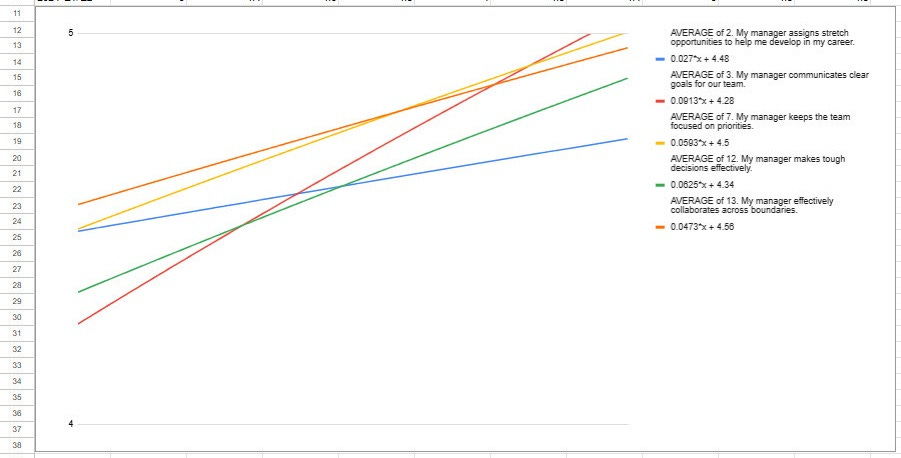Feedback Loops: What I Learned Asking My Team to Evaluate My Leadership
Using Google’s re:Work Manager Feedback Survey as a model, I collected structured, anonymous feedback for over 2 1/2 years - and it changed the way I lead.
As a manager, one of my early goals was to build a culture grounded in trust, clarity, and continuous improvement. But I quickly realized how difficult it can be to get candid, constructive feedback from direct reports. Even in strong team environments, power dynamics make it hard for people to speak openly about their manager’s performance.
I didn’t want to rely on instinct. I wanted a structured, repeatable way to understand how I was doing and how I could grow. That search led me to Google’s re:Work framework for Managers, which offers research-backed guidance for fostering people-first leadership and high-performing teams.
One resource that stood out was the Manager Feedback Survey: a short set of questions based on the traits of effective Google managers. The survey is brief, consisting of about a dozen statements rated on a Likert scale. Each statement reflects one of Google's ten key behaviors of successful managers. Here were the prompts:
I would recommend my manager to others.
My manager assigns stretch opportunities to help me develop in my career.
My manager communicates clear goals for our team.
My manager gives me actionable feedback on a regular basis.
My manager provides the autonomy I need to do my job (i.e., does not "micro-manage" by getting involved in details that should be handled at other levels).
My manager consistently shows consideration for me as a person.
My manager keeps the team focused on priorities, even when it’s difficult (e.g., declining or deprioritizing other projects).
My manager regularly shares relevant information from their manager and senior leadership.
My manager has had a meaningful discussion with me about my career development in the past six months.
My manager has the technical expertise (e.g., technical judgment in Tech, selling in Sales, accounting in Finance) required to effectively manage me.
The actions of my manager show they value the perspective I bring to the team, even if it is different from their own.
My manager makes tough decisions effectively (e.g., decisions involving multiple teams, competing priorities).
My manager effectively collaborates across boundaries (e.g., team, organizational).
The Manager Feedback Survey also asks for confidential comments:
What would you recommend your manager keep doing?
What would you have your manager change?
Inspired by this approach, I started running a version of the survey with my own team in Q1 of 2022. I began with a quarterly cadence, later shifting to bi-annual cycles. Each survey remained open for a couple of weeks, with responses fully anonymous - I had no way of knowing who responded or how they answered. I believed anonymity was essential for honest feedback.
To reinforce transparency and accountability, I also committed to sharing the aggregated results with my own manager and the entire team (all cc’ed) after each cycle. This wasn’t a performance requirement; it was a practice I chose to build trust and keep myself accountable to the feedback I received.
Over the next two and a half years, this process became one of the most valuable tools in my development as a leader. Here’s what I learned.
Strengths My Team Consistently Highlighted
After each cycle, I spent time reviewing the results, not just the ratings, but the written comments. Over time, a few themes surfaced repeatedly:
1. Transparency and Communication
Teammates consistently appreciated how I shared information from senior leadership and kept our team aligned on priorities. Even when things were uncertain or shifting, transparency helped build trust.
"I always feel that Forest is telling me what he knows - the truth."
"Providing transparency regarding projects, team priorities… makes it easier to adapt."
2. Support Without Micromanagement
Many teammates highlighted the balance I tried to maintain: giving them autonomy while staying available for support. I’ve always believed in trusting people to own their work, and it was affirming to see that reflected.
"Forest does not micromanage and seeks out opportunities for team members to take on greater responsibilities."
"I appreciate you not micromanaging and allowing us to shape our own 1:1 cadence."
3. Care and Reliability
Some of the most meaningful feedback had nothing to do with strategy or execution - it had to do with how I showed up. Words like kind, dependable, and consistent came up again and again.
"Forest is consistently kind."
"If he says he’ll do something, he does it."
"He looks for the good in everyone."
Surprises That Helped Me Grow
Even in a generally positive dataset, I paid close attention to areas where scores were slightly lower. Over time, different themes would emerge. I’d typically focus on one or two at a time, then shift to the next set with the most room for improvement in the following cycle. For example, during one cycle where I received my lowest score in these two areas:
“My manager communicates clear goals for our team.”
“My manager gives me actionable feedback on a regular basis.”
I’ll admit, these were surprising. I believed I was doing both of these things well. But the feedback helped me realize that intent doesn’t always equal impact. I had goals for the team and gave feedback frequently - but I hadn’t been explicit or consistent enough in how I communicated them.
To address the first, I made team goals a recurring topic in 1-1s. I didn’t assume everyone was aligned just because we’d talked about it once. I brought the goals into the conversation regularly and asked for input on how to improve clarity.
For feedback, I added a simple question to the end of our 1-1 agenda (I write about this here):
“Is there something specific you’d like feedback from me on?”
More than half the time, the answer was yes, and yielded some of the most interesting conversations. Just by making space for it, I created more meaningful coaching opportunities - and made it easier for teammates to ask for what they needed.
A More Data-driven Narrative On My Personal Growth
Graphing long-term trends over a two-and-a-half-year period surfaced a few insights that stuck with me. I isolated the five questions with the most meaningful upward movement. The data isn’t perfect - the sample size is small, the distribution’s probably skewed, and there are a dozen other caveats - but even with all that, it’s still useful. It serves as a gentle reminder: these are areas I need to keep top of mind so I don’t slip backward. I may not be naturally strongest in these dimensions of leadership, so continued awareness matters.
A few quick reflections on each one:
Q2. My manager assigns stretch opportunities to help me develop in my career.
This trend likely reflects the introduction of Grubhub’s Career Levels Guide, and my growing understanding of how career growth actually worked there. One of the core principles was that promotion required already performing at the next level. The challenge and the opportunity was helping people identify those gaps and then assigning complex, high-ownership projects to help close them. (Ownership was defined pretty strictly: there can only be one owner.)
Q3. My manager communicates clear goals for our team.
This one caught me off guard at first. I had a visible Capacity Plan, held regular 1:1s, and saw myself as an extremely organized person. But I took the feedback seriously and made more of an effort to be proactive in closing clarity gaps. Based on the trend, it seems like that intention translated into actual impact - or at least I was heading in the right direction.
Q7. My manager keeps the team focused on priorities.
This area showed the steepest improvement over time. Around 2022, I made a deliberate shift toward focusing on delivering value. That meant getting better at saying “no” - to extra projects, to scope creep, and sometimes to entire lines of work that didn’t align with our mission. It wasn’t always easy, but it was necessary. Additionally I worked really hard to get better at setting expectations (both cross-functionally, and up to leadership) around the delivery dates of milestones and projects using a tool I built lovingly referred to as “Git for Roadmaps” (something I plan to write about another day). I’m proud of how much progress I made here, including my mentorship of others in this area.
Q12. My manager makes tough decisions effectively.
I’ve never thought of myself as especially “tough”, but over time, as I got more comfortable across our various tech stacks (C#, Python, Java/Kotlin) and domain areas, I started trusting my judgment more. And others did too. This was one of the areas where I consistently got positive feedback from multiple managers. Many of the processes I write about here introduced constraints that could help me with quick decision making.
Q13. My manager effectively collaborates across boundaries.
When my team moved from operating on the edges to becoming more central to Grubhub’s core products in 2021, cross-functional collaboration became the norm. Suddenly, we were working with junior and senior Product Managers, Ops leaders, Solutions Consultants, and other engineering teams. We probably did more “away team” work than most groups, which provided ample opportunities - fast - to collaborate across orgs.
What Open-Ended Feedback Revealed
Beyond the ratings, the free-text responses offered rich insights - some affirming, some challenging, all helpful.
1. Timeliness in Feedback and Decisions
A few team members noted that while feedback and direction were present, they sometimes came later than ideal - especially when changes directly affected their work.
"I wish I was brought in sooner instead of finding out during standup."
"Request that I fix the issue right away instead of bringing it up days later."
This helped me realize that speed matters. Delaying feedback, even with good intentions, can undermine clarity and momentum. Since then, I’ve worked to close the gap between when I observe something and when I address it.
2. Stretch Opportunities for Growth
In early cycles, some teammates expressed a desire for more structured ways to grow technically or take on new challenges. While this improved over time, the message stuck with me: growth needs scaffolding.
"Assigning one day a week to write code would help me grow more technically."
This feedback reminded me not to assume that growth just happens organically. It needs to be encouraged, supported, and scheduled.
Final Thoughts
Inviting feedback as a manager requires humility - but it also builds trust. Over time, this practice didn’t just help me improve; it helped my team see that their voices mattered and that I was willing to evolve based on what they shared.
If you’re a manager and want to get better, don’t wait for your team to volunteer feedback. Create a system. Make it anonymous. Keep it simple. And most importantly, act on what you learn.
What started as an experiment became one of the most impactful habits of my career. And I’m better for it.




